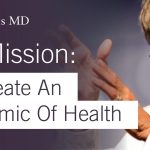Enjoy the video or read the transcript here:
The coronavirus. The influenza virus. We anticipate that the rate of infection for both of these viruses will increase over the winter. What can you do to lower the risk of acquiring both influenza and the coronavirus? What can you do to make it more likely, if you do acquire either of those infections, that you’ll have a relatively mild course and that you will be less likely to need the hospital and less likely to develop the long-hauler syndrome?
We know that in the United States we’ve had 10 million cases, and we also know that some of these patients, even though they fully recover or never needed the hospital, they still have lingering symptoms of fatigue, lingering symptoms of perhaps brain fog, and some of these folks have scarring and irritability of their heart, of their lungs, of their liver. This leads to continued problems. It leads them to difficulties returning to their work, difficulties returning to their role in their family life.
This is an incredibly important issue facing all of us, individually, our family, our communities, our states, our country, and all across the globe, which is why in January, I’m so excited that I’m going to have Dr. Elisa Song, who was one of the early leaders talking about what people could do in their self-care routines to lower the risk of severe COVID and what to do if you develop COVID and require hospitalizations. She’s going to talk about her experience, what she’s doing in her clinical practice and with her family to lower the risk of both influenza and of the coronavirus.
It’ll be a great conversation—to be included in this conversation during the Wahls Protocol Virtual Seminar, click here to get registered.
Then I will follow up that conversation with ongoing discussion, again, of what I’m doing in my clinical practice and what I am doing with my family to lower the risk of acquiring both influenza and the coronavirus and to make it more likely that if we acquire either one of those viruses that the course will be relatively mild and how to reduce the risk of long-hauler syndrome. Keep in mind that we already know even elite athletes, people who are healthy body weights, in great physical shape, some of them are developing these chronic symptoms that are taking a long time for them to recover, to get back to athletic performance, to even get back to usual activity levels of walking around, of having normal heart function, of having normal lung function and normal blood oxygen levels.
This is a very big deal.
You want to know what the science says. You want to know what the leading scientists are saying, and you can find that by going to pubmed.gov and searching the articles yourself, looking for the long-hauler syndrome, looking for what is the best advice that you can do. I encourage you to do that. Rather than relying on articles and social media, look for people who are quoting science, and you can go look at the abstracts yourself so that you can arm yourself with better knowledge, better information based on science.
Because if we’re going to get through this, it’s going to be because the countries and societies and communities that will listen to what science has taught us about the influenza virus, what science has taught us about the coronavirus, what science is telling us about who ends up in the hospital and who does not, what science is telling us about who ends up with the long-hauler syndrome and who does not, what science is telling us about what are the things under my control that could make it less likely that I’ll need the hospital, less likely that I’ll have long-hauler syndrome, and more likely that I’ll bounce right back.
That’s what I want to know. That’s why I’m reading PubMed. That’s why I’m taking courses with clinical medical education units, CME, on the coronavirus and what we can do to manage that with the latest drugs and what we can do to manage that by our diet and lifestyle choices, [inaudible 00:05:28] vitamins and supplements.
Some basic things that encourage everyone to do is know your vitamin D level. The science has been quite clear, both for influenza and the coronavirus, that those patients who have a very low vitamin D are at much higher risk for both influenza and the coronavirus. Get a vitamin D level if you can, begin a vitamin D supplement, it’d be very helpful. We also know that poor nutritional status is a significant risk for both, actually for all viral infections, because it compromises our immune system very significantly. Most Americans and most people who are eating a standardized westernized diet are starving, or don’t have enough of some key vitamins and key minerals. Adding a multivitamin, multi-mineral will be very helpful.
We also know that oxidative stress is a very big issue. The most powerful intracellular antioxidant is something called glutathione, and a nutrient that’s very helpful in supporting your body’s ability to make glutathione is N-acetylcysteine (NAC). I have used multivitamins and N acetylcysteine (NAC) and vitamin D in my clinical practice to see to it that people have addressed their nutrient needs and that they are better equipped to make the intracellular glutathione.
Let me encourage you, clean up your diet, eat more non-starchy vegetables, add a little sauerkraut and kimchi, and to make sure that we have to make sure your cells are as optimally nourished as you can have them. Then the other thing I would do is sign up for my seminar so that you’ll be there to listen to the conversation we’re going to have with Dr. Song about what she’s doing in her practice and her family and you can hear what I’m doing in my practice and with my family.
Again, this will be based on what we’re learning from pubmed.gov and what we’re learning from the courses, continuing medical education courses, that are discussing how we best manage our risk for both influenza and the coronavirus.
Do take care. There is so much that we have to learn, and those of us who pay close attention to what the science has to say about both influenza and the coronavirus will likely do the best of all. Now, much love to you and your family.”
Helpful links:
The Wahls Protocol Virtual Seminar
Information about COVID-19 continues to evolve rapidly. Stay up-to-date with the latest recommendations from the CDC and the WHO.
Institute for Functional Medicine: https://www.ifm.org/news-insights/boosting-immunity-functional-medicine-tips-prevention-immunity-boosting-covid-19-coronavirus-outbreak/
For practitioners https://www.ifm.org/news-insights/the-functional-medicine-approach-to-covid-19-virus-specific-nutraceutical-and-botanical-agents/
IFM course for practitioners: https://www.ifm.org/learning-center/resistance-resilience-and-recovery-patient-care-in-a-pandemic/
Is diet partly responsible for differences in COVID-19 death rates between and within countries?
Clinical and Translational Allergy volume 10, Article number: 16 (2020)
Strengthening the Immune System and Reducing Inflammation and Oxidative Stress through Diet and Nutrition: Considerations during the COVID-19 Crisis 2020 May 27;12(6):1562. doi: 10.3390/nu12061562.
This web site offers health, wellness, fitness and nutritional information and is provided for informational purposes only. This information is not intended as a substitute for the advice provided by your physician or other healthcare professional. You should not rely on this information as a substitute for, nor does it replace, professional medical advice, diagnosis, or treatment, Always speak with your physician or other healthcare professional before taking any medication or nutritional, herbal or homeopathic supplement, or using any treatment for a health problem. If you have or suspect that you have a medical problem, contact your health care provider promptly. Do not disregard professional medical advice or delay in seeking professional advice because of something you have read on this website. The use of any information provided on this website is solely at your own risk. Nothing stated or posted on this web site or available through any services offered by Dr. Terry Wahls LLC, are intended to be, and must not be taken to be, the practice of medicine. Information provided on this web site DOES NOT create a doctor-patient relationship between you and any doctor affiliated with our web site. Information and statements regarding dietary supplements have not been evaluated by the Food and Drug Administration and are not intended to diagnose, treat, cure, or prevent any disease.



